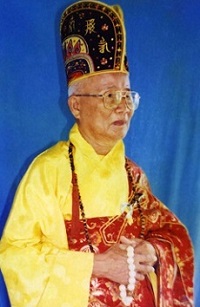GENEVA, 18 September 2019 (VCHR) – At the UN Human Rights Council’s 42nd session in Geneva today, Acting Together for Human Rights (AEDH) and the Vietnam Committee on Human Rights (VCHR) denounced Vietnam’s serious violations of human rights and freedom or religion or belief (FoRB), and the Hanoi government’s systematic refusal to engage in a genuine dialogue with the international community and civil society to improve the abysmal human rights situation in Vietnam.
In their statement, the organizations recalled the words of Lê Hòai Trung, Head of the Vietnamese delegation at the adoption of its Universal Periodic Review (UPR) in July 2019. After VCHR and other international NGOs deplored ongoing human rights violations, Mr Trung accused them of being “biased and irresponsible.” These words should not be taken lightly. They conceal a deliberate government policy that not only holds civil society in contempt, but seeks to silence all critical voices, both inside and outside the country. “If we were in Vietnam, we would probably be in prison by now!” said VCHR President Võ Văn Ái.
Indeed, since the Vietnamese Communist Party’s XII Congress in January 2016, repression against all forms of independent expression has intensified alarmingly. In September 2019, the Committee to Protect Journalists (CPJ) ranked Vietnam the 6th most repressive country in the world for freedom of expression. Today, at least 130 identified prisoners of conscience languish in Vietnam’s prisons – although the real figure is probably much higher. The crackdown on civil society continues. Just recently, on 5th September 2019, blogger Lê Văn Sinh was sentenced to five years in prison for “abusing democratic freedoms to encroach on the interests of the State” (Article 331 of the 2015 Criminal Code) for criticizing Vietnam’s leaders on his Facebook account.
Government repression extends far beyond Vietnam’s borders. In recent years, the Vietnamese authorities have kidnapped several dissidents in neighbouring countries, with or without the connivance of the local authorities. In January 2019, Trương Duy Nhất, a reporter for Radio Free Asia, was abducted in Thailand, where he had sought asylum with the UN High Commission on Refugees. He is now imprisoned in Vietnam. The government has blocked or refused entry to international NGO leaders invited to speak at Conferences in Vietnam, and VCHR leaders have frequently been blacklisted and banned entry to, or subjected to surveillance in ASEAN countries such as Thailand and Indonesia following pressure from Hanoi.
“Human rights have never been Hanoi’s priority”, said VCHR President Võ Văn Ái. “On the contrary, they are perceived as a threat to the regime’s survival. What is new today is that the Vietnamese government no longer hesitates to openly reject fundamental freedoms, democracy and pluralism.” He explained: “In April 2018, when justifying the prison sentences of up to 15 years for members of the Brotherhood for Democracy, the Foreign Ministry’s spokeswoman explicitly stated that in Vietnam, advocating democracy and pluralism was synonymous with attempting to overthrow the government”.
Moreover, Vietnam remains opposed to all forms of genuine dialogue on human rights, be it with governments of international NGOs. Mr. Ái recalled that in July 2019, at the adoption of its third UPR, Vietnam rejected many pertinent recommendations by UN member states on the pretext that they used “contentious terms”, “implying assessments that are inaccurate or alien to the reality in Viet Nam”, or making recommendations that were “improper vis-à-vis the Vietnamese people’s right to self-determination”. These recommendations included critical subjects such as the misuse of “national security” provisions to detain human rights defenders, restrictions of freedom of expression, the Internet and the press, violations of the right to freedom of religion or belief, torture, poor detention conditions and impunity.
On the right to freedom of religion or belief (FoRB), the Vietnamese government’s refusal to heed appeals by Vietnamese religious bodies and the international community has had disastrous consequences. The Law on Belief and Religion, which came into force in January 2018, is totally incompatible with international law. It has become the legal basis for increased repression against independent religious movements such as the Unified Buddhist Church of Vietnam (UBCV), some Protestant house churches, Hoa Hao, Cao Dai followers and Khmer Krom Buddhists.
Mr. Ái observed that the Law grants legal personality only to State-registered religious groups, outlawing others and criminalizing their activities. Independent religious movements are dynamic and vibrant actors of civil society, and they have remained strong and unwavering in face of wars, revolutions, repression and societal crises. Yet today, they “suffer harassments, intimidation, surveillance, confiscation of property, arrest and imprisonment” on account of their beliefs. He called on the Vietnamese government to heed the voices of religious movements and civil society, and work together to “build a just society in Vietnam.”






0 Comments
You can be the first one to leave a comment.